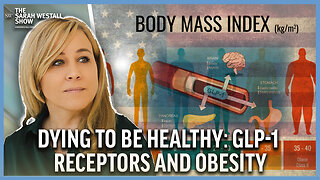Premium Only Content

Episode 2112: What is Fiducia Supplicans?
DICASTERY FOR THE DOCTRINE OF THE FAITH
Declaration
Fiducia Supplicans
On the Pastoral Meaning of Blessings
"Confident Supplicant” This term suggests that the person making the supplication is confident in their appeal or petition, perhaps because they believe strongly in the merit of their request or are assured of a positive outcome.
Víctor Manuel Card. Fernández
Prefect
Mons. Armando MATTEO
Secretary for the Doctrinal Section
Ex Audientia Die
"from hearing on the day" or "from listening to the day." This phrase might be interpreted in different ways depending on context, but generally, it suggests something related to hearing or listening on a specific day.
18 December 2023 - Francis
Its 45 paragraphs or approx. 13 pages long.
What does it say?
The "Declaration on the Pastoral Meaning of Blessings" (Fiducia Supplicans) addresses various questions concerning blessings that have been brought to the Dicastery over recent years. It emphasizes the importance of understanding and upholding the Church's traditional doctrine on marriage while also enriching the pastoral approach to blessings in alignment with Pope Francis' vision.
The document underscores that the Roman Curia's work is to serve the Pope and to promote the reception of his teaching. It references the response of Pope Francis to questions from Cardinals (Dubia), affirming the Church's stance on marriage and clarifying that no liturgical rite or blessing should be allowed that might confuse the Church's teaching on marriage.
The Declaration seeks to offer a new perspective on blessings, drawing on a pastoral vision that allows for broader and more innovative applications of blessings without altering the Church's fundamental teachings on marriage. It specifically addresses the issue of blessing couples in irregular situations or same-sex couples, advocating for a pastoral approach that respects and accompanies individuals without compromising doctrinal integrity.
The document delves into the theological and scriptural foundations of blessings, emphasizing the role of blessings as expressions of faith and trust in God's mercy. It explores blessings in both Old and New Testament contexts, highlighting the practice of blessing as a response to God's love and as a means of invoking His grace.
Furthermore, the Declaration emphasizes that while blessings should not be ritualized or used to legitimize irregular unions, they can be offered in pastoral contexts as expressions of prayer and intercession for individuals seeking God's guidance and assistance in their lives.
The Declaration emphasizes a pastoral approach to blessings, particularly in relation to couples in irregular situations or same-sex couples, emphasizing that while blessings should not be used to legitimize unions contrary to Church teaching, they can still be offered in pastoral settings with a focus on prayer and intercession.
Pastoral Contexts: The Declaration acknowledges that blessings play a significant role in pastoral care and spiritual support. They can be meaningful expressions of prayer and intercession, especially in contexts where individuals are seeking guidance, healing, or assistance from God.
Non-Ritualized Approach: The document stresses that such blessings should not be formalized or ritualized in a way that suggests approval or legitimacy of relationships that do not align with Church teaching on marriage. This caution is important to avoid confusion among the faithful regarding the Church's stance on marriage.
Expressions of Prayer: Blessings offered in pastoral contexts are seen as genuine acts of prayer. They reflect the Church's desire to accompany individuals with God's grace and mercy, regardless of their circumstances or struggles.
Intercession for Guidance: By offering blessings, ordained ministers can intercede on behalf of individuals seeking God's guidance and assistance. This underscores the Church's role in supporting and guiding its members spiritually.
Avoiding Misinterpretation: The Declaration emphasizes the need to avoid misinterpretation or misrepresentation of blessings. While they are expressions of pastoral care, they are not intended to convey approval of relationships that contradict Church teachings.
Spiritual Support: Blessings in pastoral contexts are viewed as acts of spiritual support and encouragement, affirming God's love and presence in the lives of individuals who may be experiencing challenges or seeking spiritual direction.
Overall, the Declaration advocates for a nuanced approach to blessings, rooted in pastoral sensitivity and guided by the Church's doctrinal principles. It seeks to strike a balance between showing compassionate pastoral care and maintaining fidelity to the Church's teachings on marriage and relationships. This is the easter egg paragraph where they will demand pastoral blessings.
Ultimately, the Declaration emphasizes the Church's role as a sacrament of God's infinite love, affirming the importance of blessings as opportunities for renewed encounters with Christ and expressions of God's mercy and grace in the world.
Okay so this begs 3 questions?
1. Why was this written at all? Did the Church not make its position well known prior to 2024?
It was written because a group of Cardinals saw this coming and had gotten ahead of it asking the Pope to explain his position which he didn’t and simply assigned it to the Prefect on the Doctrine of the faith.
2. What was the churches position prior to this document?
The traditional Catholic Church, prior to this letter did not approve of blessing same-sex couples. Throughout history, Catholic teaching has consistently upheld the understanding of marriage as a sacramental union between a man and a woman, reflecting the union of Christ and the Church.
The Catholic doctrine and practice regarding marriage and sexuality were based on Scripture, tradition, and the Church's magisterial teachings. The Church's stance on marriage emphasized its indissolubility, its procreative purpose, and its significance as a sacred covenant.
Same-sex relationships were considered contrary to the natural law and moral order as understood by Catholic teaching. As a result, the idea of blessing same-sex couples would not have been in line with the Church's traditional understanding of marriage and human sexuality.
So now the concillar modern liberal communistic Catholic Church's under the Francis Magestrium takes the position on marriage and same-sex relationships that it has evolved in certain pastoral aspects and in response to contemporary social contexts. So Christs truth can change with societal changes. We now tell Christ what to believe is the truth?
This Pope and his henchmen now want to change the fundamental teachings on the nature of marriage and the moral principles guiding sexual ethics remain rooted in traditional Catholic doctrine and natural law, which were affirmed both before.
3. Did a group of Cardinal issue Dubia questions prior to the release of this document?
Yes, a group of cardinals did indeed issue Dubia (Latin for "doubts" or "questions") prior to the release of the document in question. The Dubia were a series of questions posed to Pope Francis seeking clarification on certain aspects of Church teaching, particularly regarding the apostolic exhortation Amoris Laetitia, which addresses pastoral care for families.
In 2016, four cardinals—Cardinal Carlo Caffarra, Cardinal Raymond Burke, Cardinal Walter Brandmüller, and Cardinal Joachim Meisner—publicly released a letter containing five questions (Dubia) to Pope Francis. These questions sought clarification on whether certain statements in Amoris Laetitia were aligned with traditional Catholic doctrine, especially regarding the Church's teaching on the indissolubility of marriage and the reception of the sacraments by divorced and remarried Catholics.
The cardinals' concerns revolved around interpretations of Amoris Laetitia that appeared to suggest a possible change in pastoral practice regarding the reception of Communion by divorced and remarried Catholics. They sought clarity on whether the document was consistent with established Church teaching, particularly as articulated in Pope John Paul II's encyclical Familiaris Consortio.
The Dubia generated significant discussion and debate within the Church about pastoral approaches to marriage and family life. Pope Francis chose not to respond directly to the cardinals' questions, leading to further interpretations and discussions within the Church hierarchy and among theologians and scholars.
The mention of the Dubia in the document you referenced likely indicates the broader context within which this declaration was developed, showing how recent Church discussions and questions influenced the formulation of official statements and teachings.
The five dubia, presented Aug. 21, 2023 to the pope and the Vatican’s doctrine czar, posed questions about doctrinal development, same-sex blessings, the status of the synod on synodality, women priests, and the conditions for sacramental absolution.
An initial draft of the five questions — signed by the German Cardinal Walter Brandmüller, the U.S. Cardinal Raymond Burke, the Mexican Cardinal Juan Sandoval Íñiguez, the Guinean Cardinal Robert Sarah, and Hong Kong’s Cardinal Joseph Zen — was presented July 10 to Pope Francis and Cardinal Luis Ladaria Ferrer, the then prefect of the Vatican’s Dicastery for the Doctrine of the Faith.
The pope reportedly replied the next day with an extensive letter in Spanish. But according to the Italian Catholic journalist Sandro Magister, the cardinals believed that it did not answer their questions.
“Although signed by Francis, the letter displayed the writing style of his trusted theologian, the Argentine Victor Manuel Fernández, who would soon take on the new role of prefect of the dicastery for the doctrine of the faith,” Magister wrote in an Oct. 2 post on his Settimo Cielo blog
-
 LIVE
LIVE
Sarah Westall
2 hours agoDying to Be Thin: Ozempic & Obesity, Shedding Massive Weight Safely Using GLP-1 Receptors, Dr. Kazer
564 watching -
 LIVE
LIVE
LFA TV
23 hours agoThe Resistance Is Gone | Trumpet Daily 12.26.24 7PM EST
337 watching -
 LIVE
LIVE
theDaily302
11 hours agoThe Daily 302- Tim Ballard
390 watching -
 13:22
13:22
Stephen Gardner
4 hours ago🔥You'll NEVER Believe what Trump wants NOW!!
50K154 -
 54:56
54:56
Digital Social Hour
1 day ago $6.19 earnedDOGE, Deep State, Drones & Charlie Kirk | Donald Trump Jr.
22.6K -
 DVR
DVR
The Trish Regan Show
6 hours agoTrump‘s FCC Targets Disney CEO Bob Iger Over ABC News Alleged Misconduct
31.8K24 -
 1:48:19
1:48:19
The Quartering
6 hours agoElon Calls White People Dumb, Vivek Calls American's Lazy & Why Modern Christmas Movies Suck!
105K84 -
 2:08:42
2:08:42
The Dilley Show
7 hours ago $30.49 earnedH1B Visa Debate, Culture and More! w/Author Brenden Dilley 12/26/2024
96.9K24 -
 4:55:59
4:55:59
LumpyPotatoX2
10 hours agoThirsty Thursday on BOX Day - #RumbleGaming
96.4K5 -
 1:04:52
1:04:52
Geeks + Gamers
9 hours agoDisney RATIO'D on Christmas Day | Mufasa Embarrassed By Sonic 3
70.9K5